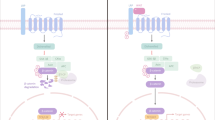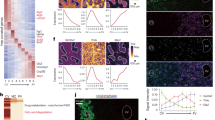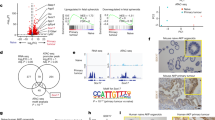Abstract
Germline mutations in STK11 (also known as LKB1) are found in individuals with Peutz-Jeghers syndrome (PJS)1 manifesting with gastrointestinal polyps that contain a prominent stromal component. Epithelia in polyps of Stk11+/− mice can retain a functional copy of Stk11 (refs. 2,3), and loss of heterozygosity is not an obligate feature of human polyps4, raising the possibility of non-epithelial origins in tumorigenesis. Here we show that either monoallelic or biallelic loss of murine Stk11 limited to Tagln-expressing mesenchymal cells results in premature postnatal death as a result of gastrointestinal polyps indistinguishable from those in PJS. Stk11-deficient mesenchymal cells produced less TGFβ, and defective TGFβ signaling to epithelial cells coincided with epithelial proliferation. We also noted TGFβ signaling defects in polyps of individuals with PJS, suggesting that the identified stromal-derived mechanism of tumor suppression is also relevant in PJS.
This is a preview of subscription content, access via your institution
Access options
Subscribe to this journal
Receive 12 print issues and online access
$209.00 per year
only $17.42 per issue
Buy this article
- Purchase on Springer Link
- Instant access to full article PDF
Prices may be subject to local taxes which are calculated during checkout




Similar content being viewed by others
References
Hemminki, A. et al. A serine/threonine kinase gene defective in Peutz-Jeghers syndrome. Nature 391, 184–187 (1998).
Bardeesy, N. et al. Loss of the Lkb1 tumour suppressor provokes intestinal polyposis but resistance to transformation. Nature 419, 162–167 (2002).
Rossi, D.J. et al. Induction of cyclooxygenase-2 in a mouse model of Peutz-Jeghers polyposis. Proc. Natl. Acad. Sci. USA 99, 12327–12332 (2002).
Hernan, I. et al. De novo germline mutation in the serine-threonine kinase STK11/LKB1 gene associated with Peutz-Jeghers syndrome. Clin. Genet. 66, 58–62 (2004).
Sanchez-Cespedes, M. et al. Inactivation of LKB1/STK11 is a common event in adenocarcinomas of the lung. Cancer Res. 62, 3659–3662 (2002).
Ji, H. et al. LKB1 modulates lung cancer differentiation and metastasis. Nature 448, 807–810 (2007).
Entius, M.M. et al. Peutz-Jeghers polyps, dysplasia, and K-ras codon 12 mutations. Gut 41, 320–322 (1997).
Ylikorkala, A. et al. Vascular abnormalities and deregulation of VEGF in Lkb1-deficient mice. Science 293, 1323–1326 (2001).
Kuhbandner, S. et al. Temporally controlled somatic mutagenesis in smooth muscle. Genesis 28, 15–22 (2000).
Boesten, L.S. et al. Mdm2, but not Mdm4, protects terminally differentiated smooth muscle cells from p53-mediated caspase-3-independent cell death. Cell Death Differ. 13, 2089–2098 (2006).
Entius, M.M. et al. Molecular genetic alterations in hamartomatous polyps and carcinomas of patients with Peutz-Jeghers syndrome. J. Clin. Pathol. 54, 126–131 (2001).
Hawley, S.A. et al. Complexes between the LKB1 tumor suppressor, STRADalpha/beta and MO25alpha/beta are upstream kinases in the AMP-activated protein kinase cascade. J. Biol. 2, 28 (2003).
Shaw, R.J. et al. The LKB1 tumor suppressor negatively regulates mTOR signaling. Cancer Cell 6, 91–99 (2004).
Owens, G.K., Kumar, M.S. & Wamhoff, B.R. Molecular regulation of vascular smooth muscle cell differentiation in development and disease. Physiol. Rev. 84, 767–801 (2004).
Powell, D.W., Adegboyega, P.A., Di Mari, J.F. & Mifflin, R.C. Epithelial cells and their neighbors I. Role of intestinal myofibroblasts in development, repair, and cancer. Am. J. Physiol. Gastrointest. Liver Physiol. 289, G2–G7 (2005).
Hirschi, K.K., Rohovsky, S.A. & D'Amore, P.A. PDGF, TGF-beta, and heterotypic cell-cell interactions mediate endothelial cell-induced recruitment of 10T1/2 cells and their differentiation to a smooth muscle fate. J. Cell Biol. 141, 805–814 (1998).
Kuemmerle, J.F. Autocrine regulation of growth in cultured human intestinal muscle by growth factors. Gastroenterology 113, 817–824 (1997).
Kurokowa, M., Lynch, K. & Podolsky, D.K. Effects of growth factors on an intestinal epithelial cell line: transforming growth factor beta inhibits proliferation and stimulates differentiation. Biochem. Biophys. Res. Commun. 142, 775–782 (1987).
Russell, W.E., Coffey, R.J. Jr., Ouellette, A.J. & Moses, H.L. Type beta transforming growth factor reversibly inhibits the early proliferative response to partial hepatectomy in the rat. Proc. Natl. Acad. Sci. USA 85, 5126–5130 (1988).
Halttunen, T., Marttinen, A., Rantala, I., Kainulainen, H. & Maki, M. Fibroblasts and transforming growth factor beta induce organization and differentiation of T84 human epithelial cells. Gastroenterology 111, 1252–1262 (1996).
Bhowmick, N.A. et al. TGF-beta signaling in fibroblasts modulates the oncogenic potential of adjacent epithelia. Science 303, 848–851 (2004).
Kim, B.G. et al. Smad4 signalling in T cells is required for suppression of gastrointestinal cancer. Nature 441, 1015–1019 (2006).
Haramis, A.P. et al. De novo crypt formation and juvenile polyposis on BMP inhibition in mouse intestine. Science 303, 1684–1686 (2004).
Abe, M. et al. An assay for transforming growth factor-beta using cells transfected with a plasminogen activator inhibitor-1 promoter-luciferase construct. Anal. Biochem. 216, 276–284 (1994).
Masur, S.K., Dewal, H.S., Dinh, T.T., Erenburg, I. & Petridou, S. Myofibroblasts differentiate from fibroblasts when plated at low density. Proc. Natl. Acad. Sci. USA 93, 4219–4223 (1996).
Acknowledgements
We thank D. Rifkin (New York University Medical Center) and K. Koli (Haartman Institute, University of Helsinki) for reagents and advice on the TGFβ assays, and S. Räsänen, O. Kokkonen, J. Bärlund, B. Tjäder, S. Laine and K. Mänttäri for technical assistance. This work was supported by grants from the Academy of Finland, Biocentrum Helsinki, Finnish Cancer Organization, Ida Montin Foundation, Orion-Farmos Research Foundation and Sigrid Juselius Foundation. R.A.D. is an American Cancer Society Research Professor and is supported by grants from the US National Institutes of Health and the Belfer Foundation.
Author information
Authors and Affiliations
Corresponding author
Supplementary information
Supplementary Text and Figures
Supplementary Methods, Supplementary Figures 1–3 (PDF 800 kb)
Rights and permissions
About this article
Cite this article
Katajisto, P., Vaahtomeri, K., Ekman, N. et al. LKB1 signaling in mesenchymal cells required for suppression of gastrointestinal polyposis. Nat Genet 40, 455–459 (2008). https://doi.org/10.1038/ng.98
Received:
Accepted:
Published:
Issue Date:
DOI: https://doi.org/10.1038/ng.98
This article is cited by
-
Progress report: Peutz–Jeghers syndrome
Familial Cancer (2024)
-
Smooth muscle-specific MMP17 (MT4-MMP) regulates the intestinal stem cell niche and regeneration after damage
Nature Communications (2021)
-
Modulating Tumor Microenvironment: A Review on STK11 Immune Properties and Predictive vs Prognostic Role for Non-small-cell Lung Cancer Immunotherapy
Current Treatment Options in Oncology (2021)
-
Colon cancer of Peutz-Jeghers syndrome with gallolyticus endocarditis
Clinical Journal of Gastroenterology (2020)
-
An FBXW7-ZEB2 axis links EMT and tumour microenvironment to promote colorectal cancer stem cells and chemoresistance
Oncogenesis (2019)



